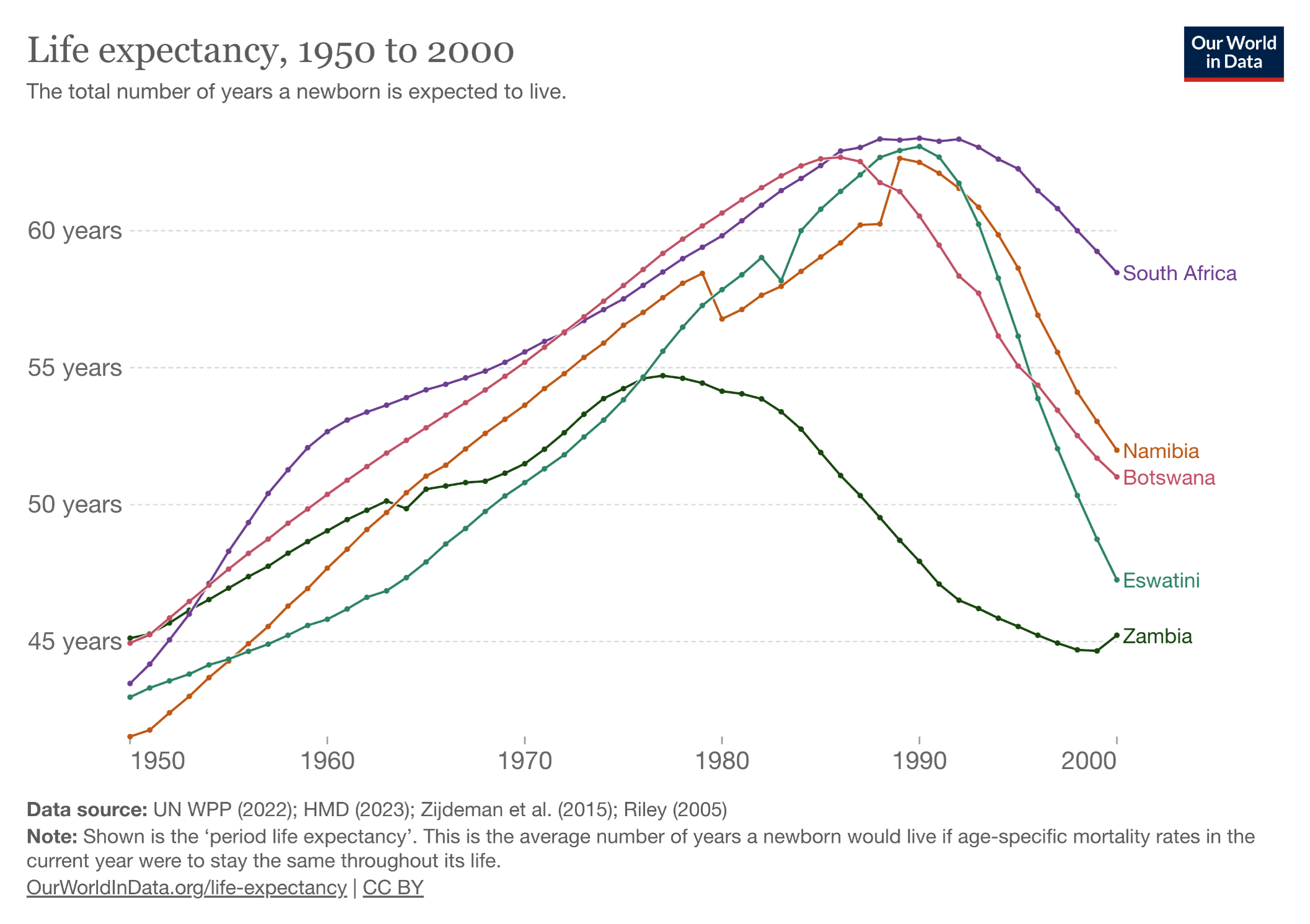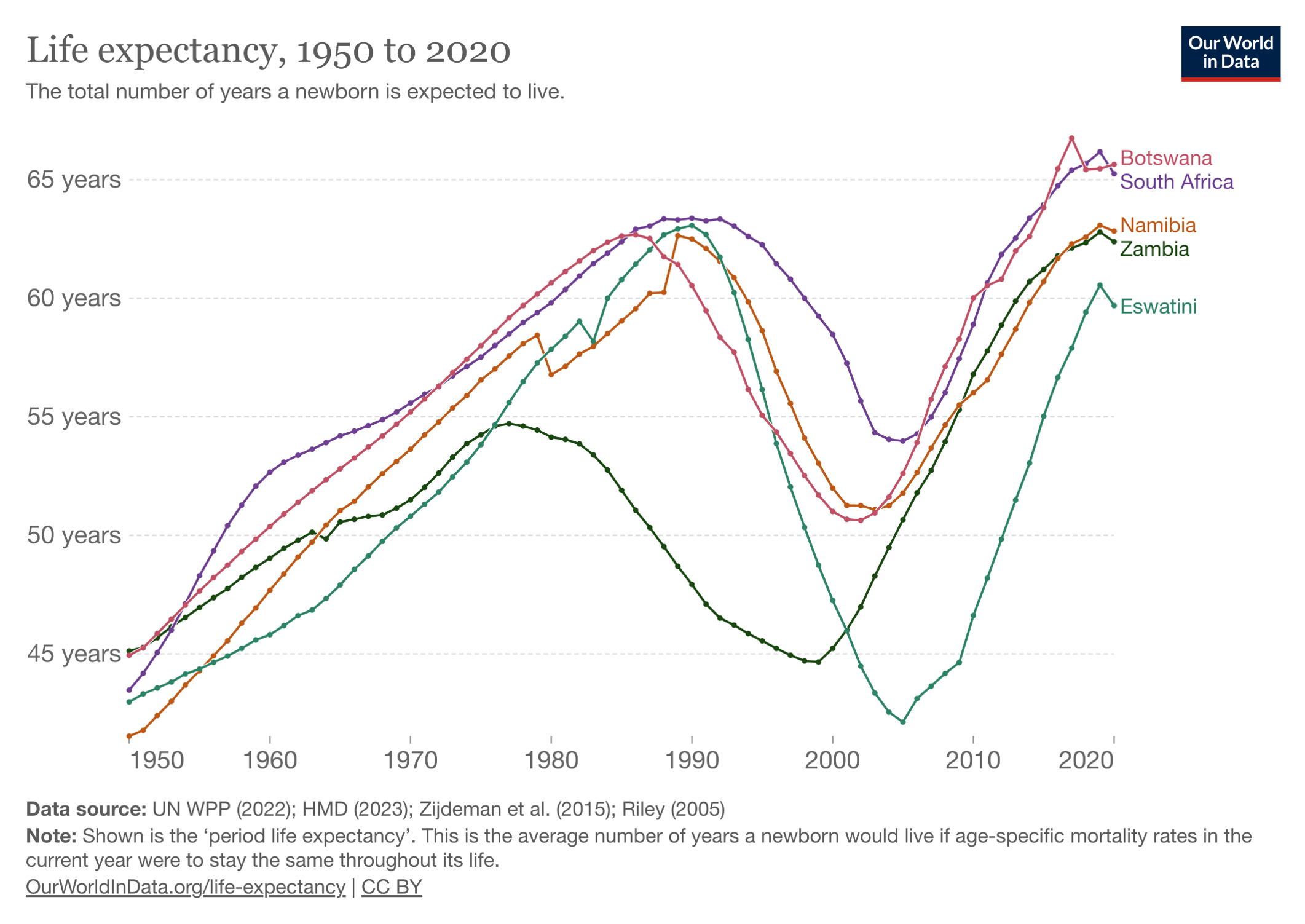An ongoing dialogue on HIV/AIDS, infectious diseases,
February 6th, 2025
Could This Be the End of PEPFAR?
Short email from a longtime colleague, working in Africa at a PEPFAR site:
Without USAID, PEPFAR is essentially dead.
I got chills reading this.
PEPFAR, the abbreviation for the President’s Emergency Plan for AIDS Relief, started in 2003 under the direction of President George W. Bush. To say it’s been a resounding success undersells the impact of the program. Take a look at these two graphs, first the trend in life expectancy in several African countries (all PEPFAR recipients) before access to HIV therapy:

Now let’s look at what happened after the broad roll-out of HIV treatment, greatly facilitated by PEPFAR:

The PEPFAR program shows what happens when you pour resources into a devastating problem with a highly effective solution — in this case, a rapidly progressive and fatal disease of younger people (AIDS), with subsequent halting of that disease with antiretroviral therapy. Widely cited — and credible — estimates are that PEPFAR has saved more than 26 million lives. It has been so effective that for years it garnered bipartisan support from U.S. politicians who otherwise agreed on hardly anything.
What does USAID have to do with PEPFAR? USAID collaborates with PEPFAR and local partners to implement HIV programs, ensuring the delivery of antiretroviral therapy and other critical services. The sudden freeze in aid disrupts these efforts, potentially jeopardizing the health of countless individuals who rely on consistent HIV care. To quote again my colleague:
USAID manages the supply chain with multiple donors and products — drugs, reagents, equipment. They represent a substantial portion of the PEPFAR budget in my country.
Some have argued that provision of HIV care internationally should shift to be the responsibility of the host countries, especially now that ART has become so inexpensive and widely available. While I understand this argument, isn’t the sensible approach to make this transition gradually, or at least with some warning? And what about the other essential work of USAID? If this action is done solely to save the Federal government money, it’s not going to have much effect. As a reminder, only around 1% of the Federal budget goes to economic foreign aid, and not all of that to USAID.
Beyond the primary concern, which is the health of individuals receiving care and treatment through this program, there’s the reputation cost for our country. A country that supports effective foreign aid in poor nations is considered generous and kind; one that suddenly pulls such aid the polar opposite — selfish and cruel. Another communication from a colleague in a different country:
As a result of the PEPFAR/USAID freezes, we lost a third of our staff in our HIV clinic, mostly people who dedicated their entire professional lives to the clinic. The offices are empty and corridors echo where they didn’t before.
Let’s contrast this with the joy this program engendered when it started. I distinctly remember meeting a doctor from Nigeria in the early days of PEPFAR; he was smiling broadly at the extraordinary effectiveness of ART that he could now give to literally hundreds of his patients. Shaking my hand, he said — “We cannot thank you enough. Please tell President Bush.”
I never met the former President, but I certainly would do so if I had the chance.
The views and opinions expressed in this blog do not represent those of NEJM Journal Watch, NEJM Group, or the Massachusetts Medical Society.


Timely and well said! Thank you Dr. Sax!
I’m all for cutting government waste, but this is such a weird and destructive choice.
Someone should remind Pres. Trump that this will tarnish his Nobel Prize for peace.
This will result in so much death and suffering.
It’s a coup. Let’s call it what it is.
I might be said that the guiding principles of the current administration are ignorance, selfishness, cruelty.
Dr. Sax, in your opinion, what is motivating this freeze? Ignoring ethics and compassion, if one cares solely about power and money, this decision does not make sense.
What can we do as a group of professionals caring for people with HIV?
Thank you Paul for sharing this important information and data. It is incredibly sad and hard to understand why this administration is set on destroying our US public and global health networks.
What can we do…continue to speak out, educate, and push back. Share Paul’s data with as many people possible. I believe many Americans who voted for this President are compassionate people but do not understand the implications of his attacks on the CDC, USAID, PEPFAR…..Kennedy to head DHHS.
This was the good work of USAID. The funding for Hamas terrorist infrastructure, not so much.
I am infectious diseases/HIV doctor from Ukraine and i am looking into the future with fear. Is it possible for my country in war provide HIV care without PERFAR?